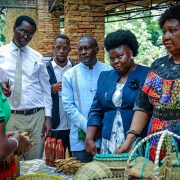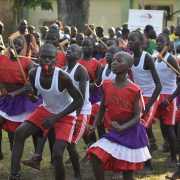Declining cultural heritage resources are rarely presented as a humanitarian issue, we are convinced that immediate action is necessary to protect our vanishing cultural heritage as a means to strengthen the observance of Ugandans’ cultural rights. Thus, one of CCFU’s main programme areas focuses on enhancing an appreciation and promotion of cultural rights.
1. Promoting the understanding of cultural rights
Few Ugandans are conversant with cultural rights, yet these are as important as any other rights. Cultural rights are provided for under national and international laws. We must indeed express to policymakers the need for policy change to place cultural rights much higher on the national agenda than is currently the case. Accordingly, CCFU is promoting a better understanding of cultural rights in Uganda through publications, exposure events and capacity building training events, especially on integrating a ‘Culture in Development’ approach in development interventions. In collaboration with a range of other organisations and cultural heritage activists, CCFU has spearheaded a coalition to lobby relevant key policymakers and government to mainstream cultural rights in our programming activities as a country.
2. Promoting cultural rights of Indigenous Minority Groups (IMGs)
The cultural rights of indigenous minorities are especially at risk and require urgent attention (in terms of status, access to one’s language and cultural heritage, political representation and access to cultural sites). Further, indigenous minorities are often at risk of seeing their culture assimilated by more numerous neighbouring groups. CCFU therefore works with indigenous minorities to develop status reports and engage district authorities on their cultural rights. The Foundation is also active in documenting and publicizing oral histories, supporting advocacy platforms at the district and national levels; profiling their cultural identities and developing cultural resource centres and community museums as sustainable enterprises. CCFU established the National Coalition for the Rights of Indigenous Minorities and has supported the Karamoja, Rwenzori and West Nile groups through regional platforms.
3. Promoting the cultural rights of women and girls
Culture and traditions have been often perceived in Uganda as re-inforcing gender inequality and inequity and abetting the oppression of women and girls. In 2017, CCFU with support from Diakonia started a programme aimed at enhancing women’s empowerment using culturally defined rights. So far, the Foundation has produced several case studies with the generous support from UN Women under the Spotlight Initiative. CCFU has implemented projects in various cultural communities in Uganda including Acholi, Alur, Buganda, Busoga, Karamoja and Tooro highlighting how cultural resources can be harnessed to end violence against women and girls, promote sexual reproductive health and rights, and enhance women and girls’ access to justice.
4. Cultural enterprises
CCFU supports groups of youth and women from Indigenous Minority Groups engaging in cultural enterprises that promote their livelihood through the use of cultural resources. This initiative intends to highlight the value of culture through cultural activities organised and managed by the youth and women not only as a source of income but also as a way of promoting diverse cultural identities and other positive aspects of culture.
With support from Total Energies EP Uganda, CCFU is also implementing a project, “Culture for Livelihood” to safeguard cultural heritage in Bunyoro, Bugungu, Alur and Acholi. The project aims at identifying, safeguarding and promoting traditional knowledge, facilitation of value addition in crafts making and traditional music, building the capacity of traditional music troupes and crafts workers in organisation management, publicity, and marketing. As well as promoting intercultural collaboration and diversity of goods and services in the creative industry in turn, deepening awareness about the importance and role of the crafts industry and traditional music in promoting livelihoods of communities.







